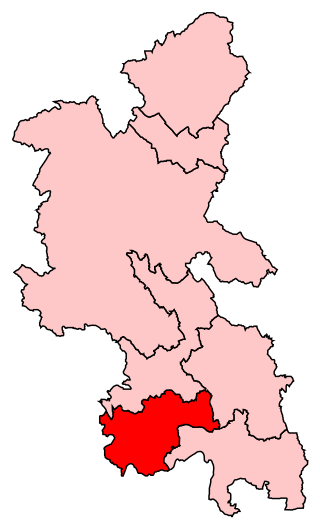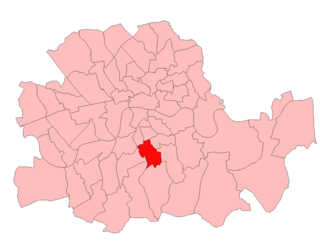
The 1938 Aylesbury by-election was a parliamentary by-election for the British House of Commons constituency of Aylesbury on 19 May 1938.

The 1938 Aylesbury by-election was a parliamentary by-election for the British House of Commons constituency of Aylesbury on 19 May 1938.
The by-election was caused by the resignation of the sitting Conservative MP, Michael Beaumont on 2 May 1938. He had been MP here since winning the seat in 1929.
Aylesbury had been won by the Conservatives at every election since 1918 apart from 1923 when the Liberal Thomas Keens won the seat. The result at the last General election was:
| Party | Candidate | Votes | % | ±% | |
|---|---|---|---|---|---|
| Conservative | Michael Beaumont | 24,728 | 57.4 | ||
| Liberal | Margaret Wintringham | 13,622 | 31.6 | ||
| Labour | E W Shearer | 4,716 | 11.0 | ||
| Majority | 11,106 | 25.8 | |||
| Turnout | 43,066 | ||||
| Conservative hold | Swing | ||||
The local Conservatives selected Sir Stanley Reed as candidate. He was a 66-year-old who had been a newspaper editor in India where he lived for 50 years. The Liberal candidate from the last General Election, Margaret Wintringham, was not available to stand as she had been selected as prospective Liberal candidate for Gainsborough. The local Liberal Association selected 64-year-old former Finchley MP, Atholl Robertson. He had represented Finchley from 1923–24 and had stood there last time but had since been replaced as candidate. On 24 April 1937 the local Labour Party had selected a new candidate in Reginald Groves, a Trotskyist.
The Liberal campaign sought to appeal to those who supported a Popular Front. Robertson had secured the support of the Communist Party, which had signed up fully to the Popular Front message. Robertson called for arms for Spain, defence of democratic liberties and the economic and social advance of the people.
The Labour candidate, Reginald Groves came under pressure to withdraw in favour of the Liberal candidate, when a group of local Labour Party supporters met and formed themselves into a 'Progressive Alliance' group. This group included 34-year-old Christopher Addison, son of the Labour Lord who had been a Liberal Cabinet Minister in Lloyd George's government. Other group members included author Ladbroke Black. The group Chairman was local JP, John Murphy. The meeting passed the following resolution; "We, the undersigned, deploring the international situation created by the National Government, have united without foregoing our individual political principles in forming a Progressive Alliance Group with the object of securing the registration of an effective anti-Government poll in the Mid-Bucks by-election, by supporting Mr. T Atholl Robertson." This was followed up by a statement which added ".. we appeal to our fellows to work and vote for the Liberal candidate... We also very seriously suggest to the Labour candidate, Mr Reginald Groves, that the greatest service he could render to the cause of democracy and peace would be to withdraw from the contest and lend his support to the candidate who had incomparably the better chance of defeating the representative of the National Government.....The only question before us is whether we approve or disapprove of the domestic and foreign policy now being pursued by Mr Chamberlain....We believe that if.. the Liberal and Labour candidates agreed to sink their differences....Mid-Bucks could be added to the list of constituencies which in the past weeks have shown the government how deeply the nation resents its betrayal of both democracy and British interests in its pursuance of a non-intervention policy which ...amounts to intervention on behalf of the Italian and German invaders against the people of Spain." In addition, the neighbouring South-Bucks constituency had seen the local Liberal and Labour parties join together to form a South-Bucks Unity Committee. This group also called upon Groves to withdraw in favour of Robertson.
Groves retained the support of the Daily Herald newspaper which was a traditional supporter of the Labour Party and a majority of his own local executive. He was also still able to attract leading Labour politicians to speak on his campaign platform, such as Clement Attlee, Ellen Wilkinson and Harold Laski. Groves also won support from the Independent Labour Party.
On 12 May, David Lloyd George's Council of Action announced that it would play no part in the campaign because both Liberal and Labour candidates had given satisfactory answers to its questions. The replies Groves gave to them were clearly misleading and at odds with his own Trotskyist views. The Council was a strong supporter of action from the League of Nations yet in his manifesto Groves declared “a successful League of Nations is not possible until the people are able to express and enforce effectively their will to peace”.
| Party | Candidate | Votes | % | ±% | |
|---|---|---|---|---|---|
| Conservative | Stanley Reed | 21,695 | 54.1 | -1.3 | |
| Liberal | Thomas Atholl Robertson | 10,751 | 26.8 | -4.8 | |
| Labour | Reginald Groves | 7,666 | 19.1 | +8.2 | |
| Majority | 10,944 | 27.3 | +1.5 | ||
| Turnout | 40,112 | 63.1 | -7.1 | ||
| Conservative hold | Swing | ||||
Groves, the defeated Labour candidate claimed after the result that “we have delivered the death-blow to Liberalism in this division.” The Communist Party supporting Daily Worker criticised Groves “divisive Trotskyist splitting tactics”.
The result at the following General election;
| Party | Candidate | Votes | % | ±% | |
|---|---|---|---|---|---|
| Conservative | Stanley Reed | 24,537 | 47.8 | -5.3 | |
| Labour | Reginald Groves | 16,445 | 32.1 | +13.1 | |
| Liberal | Guy Naylor | 10,302 | 20.1 | -6.7 | |
| Majority | 8,092 | 15.7 | |||
| Turnout | 51,284 | 69.5 | +6.4 | ||
| Conservative hold | Swing | ||||

Aylesbury is a constituency represented in the House of Commons of the UK Parliament since 2019 by Rob Butler of the Conservative Party.

Wycombe is a constituency in Buckinghamshire represented in the House of Commons of the UK Parliament since 2010 by Steve Baker, a Conservative.
The 1922 Newport by-election was by-election held in the parliamentary constituency of Newport on 18 October 1922. The by-election attracted especial attention, both at the time and since, as it was seen as a crucial electoral test of the viability of the Lloyd George Coalition Government, formed of followers of David Lloyd George with the Conservative Party, the latter of which contained an increasing number of members who wished to leave the coalition and regain the party's independence.
The 1921 Penistone by-election was a by-election held on 5 March 1921 for the British House of Commons constituency of Penistone in Yorkshire.
The 1943 Darwen by-election was a by-election held on 15 December 1943 for the British House of Commons constituency of Darwen in Lancashire.
The 1945 Newport by-election was a parliamentary by-election held on 17 May 1945 for the British House of Commons constituency of Newport in Monmouthshire. It was the last by-election of the 1935–1945 Parliament.
The 1938 Bridgwater by-election was a parliamentary by-election for the British House of Commons constituency of Bridgwater, Somerset held on 17 November 1938.

Ivor Roland Morgan Davies CBE was a British Liberal Party politician, journalist and United Nations Association administrator. Politically, his chief claim to fame was his decision in October 1938 to withdraw as Liberal candidate at the Oxford by-election along with the Labour candidate Patrick Gordon-Walker to allow an independent, Popular Front, anti-Munich candidate, A. D. Lindsay, the Master of Balliol, to challenge the government candidate Quintin Hogg.
The 1945 Neath by-election was a parliamentary by-election held for the British House of Commons constituency of Neath in South Wales.

Thomas Atholl Robertson was a Scottish fine arts printer and publisher and Liberal politician.
The 1939 Holderness by-election was a parliamentary by-election held on 15 February 1939 for the British House of Commons constituency of Holderness in the East Riding of Yorkshire.
The 1939 Batley and Morley by-election was a parliamentary by-election held in the United Kingdom on 9 March 1939 for the House of Commons constituency of Batley and Morley in the West Riding of Yorkshire.
The 1919 Manchester Rusholme by-election was a parliamentary by-election held in October 1919 for the British House of Commons constituency of Manchester Rusholme. The by-election was important for shaping the future Labour Party attitude to electoral relations with the Liberal Party.
The 1928 Tavistock by-election was a parliamentary by-election for the British House of Commons constituency of Tavistock on 11 October 1928.
The 1917 Aberdeen South by-election was a parliamentary by-election for the House of Commons constituency of Aberdeen South comprising the local government wards in the southern part of the city of Aberdeen. The by-election took place on 3 April 1917.

The 1944 Bury St Edmunds by-election was a parliamentary by-election for the British House of Commons constituency of Bury St Edmunds, Suffolk on 29 February 1944.
The 1941 Lancaster by-election was a parliamentary by-election for the British House of Commons constituency of Lancaster, Lancashire on 15 October 1941.
The 1943 Daventry by-election was a parliamentary by-election for the British House of Commons constituency of Daventry, Northamptonshire on 20 April 1943.
The 1927 Canterbury by-election was a parliamentary by-election for the British House of Commons constituency of Canterbury, Kent on 24 November 1927.

The 1920 Camberwell North West by-election was a parliamentary by-election held for the British House of Commons constituency of Camberwell North West in the South London district of Camberwell on 31 March 1920.